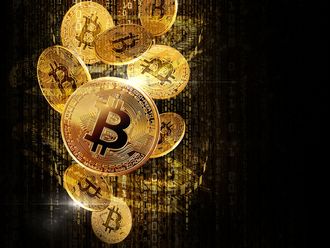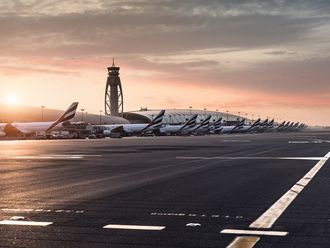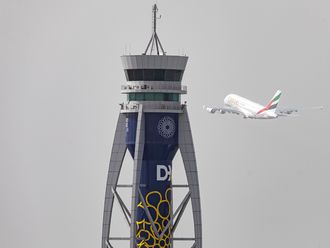Tokyo: Asian stocks fell a fifth day, with the regional benchmark index headed for the longest losing streak in two months, as economic reports from the US to China and Australia stoked concern global growth is slowing.
Samsung Electronics, South Korea’s largest exporter of consumer electronics that gets 20 per cent of its revenue in America, lost 2.4 per cent in Seoul. Westpac Banking Corp, Australia’s No 2 lender by market value, slid 1.5 per cent in Sydney as the country’s economy grew at a slower-than-estimated rate. Fortescue Metals Group, Australia’s third-biggest iron-ore producer, plunged 8.5 per cent as prices of the steelmaking material fell to a three-year low on slowing growth in China.
The MSCI Asia Pacific Index dropped 1.3 per cent to 115.74 as of 7:15pm in Tokyo, heading for the longest losing streak since the period ended July 12. More than four stocks declined for each that advanced on the gauge. Volatility across the region gained before the European Central Bank meets tomorrow.
“The macro backdrop is quite challenging and growth conditions are fragile obviously,” said Nader Naeimi, Sydney- based head of dynamic asset allocation at AMP Capital Investors Ltd, which manages almost $100 billion (Dh367 billion). “The market is getting nervous about going into the ECB meeting. There’s a lot of speculation on the ECB about what they will do.”
The MSCI Asia Pacific Index was little changed this quarter through yesterday as expectations for further stimulus measures overshadowed signs of a global economic slowdown. The Asian benchmark traded at 12.3 times estimated earnings as of last week, compared with 13.6 times for the Standard & Poor’s 500 Index and 11.6 times for the Stoxx Europe 600 Index.
Australian growth
Australia’s S&P/ASX 200 fell 0.6 per cent after a report showed the nation’s economy slowed more in the second quarter than economists expected. New Zealand’s NZX 50 Index dropped 0.2 per cent. Japan’s Nikkei 225 Stock Average fell 1.1 per cent, while South Korea’s Kospi Index slid 1.7 per cent.
Hong Kong’s Hang Seng Index fell 1.5 per cent. The Shanghai Composite Index lost 0.3 per cent after the HSBC China Services PMI fell to 52.0 in August from 53.1 in July. Taiwan’s Taiex Index lost 1.1 per cent and Singapore’s Straits Times Index slid 0.5 per cent.
Futures on the Standard & Poor’s 500 Index lost 0.5 per cent yesterday. The index declined 0.1 per cent in New York on Tuesday, when the Institute for Supply Management’s US factory index showed US manufacturing shrank for a third month in August, the longest decline since the recession ended in 2009.
Exporters to the US declined. Samsung Electronics dropped 2.4 per cent to 1.189 million won. Li & Fung Ltd, a supplier of toys and clothes to Walmart Stores, fell 2.5 per cent to HK$11.62 in Hong Kong.
Banks slip
Australian shares fell after the government reported the nation’s economy grew 0.6 per cent last quarter from the previous three months. That missed a 0.7 per cent expansion forecast by economists surveyed by Bloomberg and was less than half the 1.3 per cent pace in the first quarter.
Westpac fell 1.5 per cent to A$23.95. Commonwealth Bank of Australia, the nation’s biggest lender by market value, slid 0.2 percent to A$54.55.
Volatility across the region rose as investors awaited developments out of Europe. Mario Draghi, president of the European Central Bank, said the central bank’s primary mandate compels it to intervene in bond markets to wrest back control of interest rates and ensure the euro’s survival. His comments came before the ECB’s Governing Council is due to decide on his bond- buying proposal tomorrow.
Melting Pot
“You throw everything into the melting pot, and that’s why you get this volatility on a day-to-day basis,” said Cameron Peacock, a Melbourne-based market analyst at IG Markets, a provider of trading services for stocks, bonds and currencies. “You’ve got people positioning themselves ahead of these announcements. Some people are happy to get in there and position themselves for risk. Some people say, ‘Not for me and I will sit on the sidelines and wait and see what happens.’”
The Nikkei Stock Average Volatility Index gained 3 per cent to 20.69, indicating traders expect a swing of about 5.9 per cent on the benchmark gauge over the next 30 days. Measures of anticipated price movements for the Hang Seng Index, the S&P/ASX 200 Index and the Kospi 200 Index also climbed.
Material and energy shares dropped the most on the Asia-Pacific benchmark equity gauge yesterday. Iron-ore prices plummeted 24 per cent in August, the most in 10 months, sliding to $88.70 a metric tonne on August 30, the lowest since October 30, 2009. The prices fell on concern slowing growth in China, the biggest buyer, will curb demand.
Fortescue Metals lost 8.5 per cent to A$3.12 after on Tuesday cutting its full-year capital spending forecast by 26 per cent to $4.6 billion. The shares had biggest drop on the Asian benchmark measure. Sundance Resources Ltd., the target of a takeover by China’s Sichuan Hanlong Group, slumped 13 per cent to 26.5 Australian cents.












